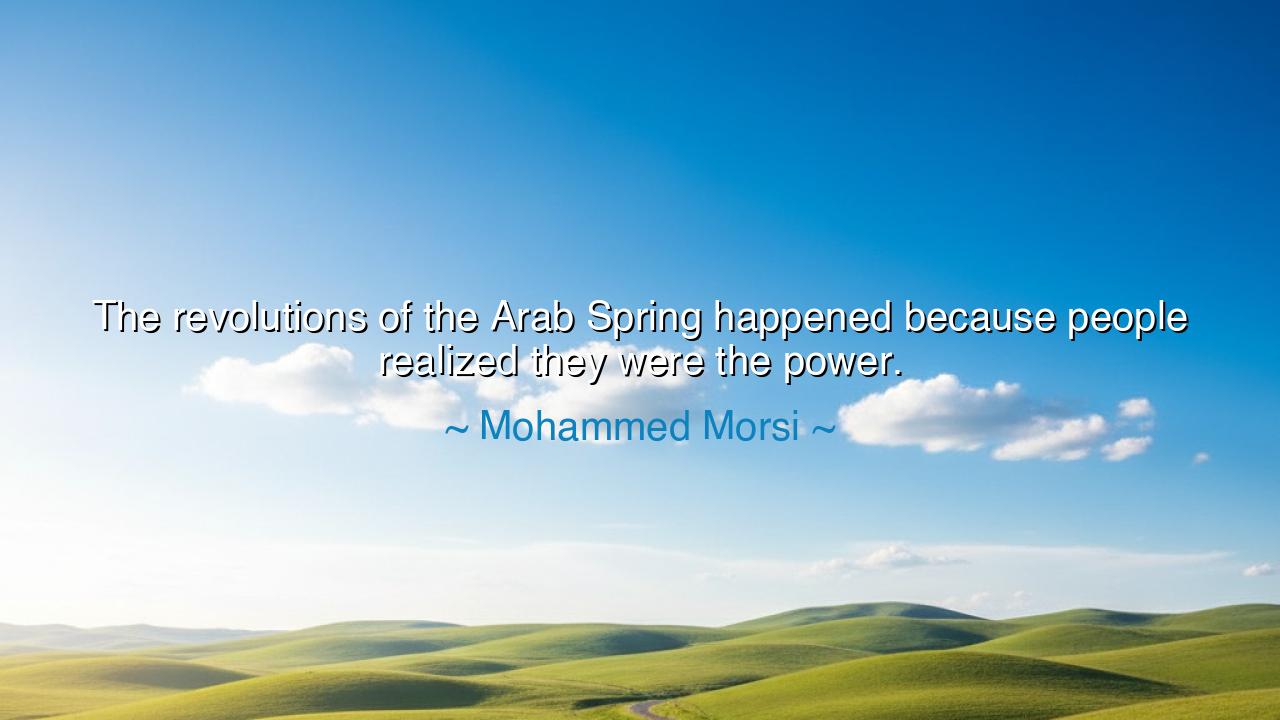
The revolutions of the Arab Spring happened because people
The revolutions of the Arab Spring happened because people realized they were the power.






The words of Mohammed Morsi—“The revolutions of the Arab Spring happened because people realized they were the power.”—echo like the roar of a multitude awakening from silence. For centuries, rulers sat upon thrones believing themselves divine, and citizens bowed in fear, forgetting the strength within their own hands. Yet in the days of the Arab Spring, the veil was torn away, and the people saw themselves not as subjects, but as the very power upon which empires stand. In that revelation lay the seed of revolution.
This utterance speaks to the eternal truth of sovereignty. Kings, dictators, and tyrants draw their might not from the heavens, but from the obedience of the governed. When the governed remember their strength, the illusion of invincibility shatters. Morsi, himself swept into power by this tide, recognized that the force of millions united is greater than the armies, prisons, and palaces of the few. The people themselves are the foundation, and when they withdraw their consent, the edifice of oppression collapses.
History offers us the mirror of the French Revolution. For centuries, the monarchy claimed divine right, feasting while peasants starved. But when the people discovered their collective power, they stormed the Bastille, toppled the throne, and remade their nation. Just as in the Arab Spring, the moment of awakening came when the multitude ceased to believe that power resided only in crowns and scepters, and declared instead that sovereignty was theirs by birthright.
The quote also carries a message of hope and warning. Hope, for it reminds all oppressed that they are never powerless, that within unity lies the strength to break chains. But also warning, for power without wisdom can devour itself. The revolutions of the Arab Spring brought both liberation and turmoil, showing that to seize power is but the beginning; to wield it justly is the greater labor.
Let this truth be passed down: never forget that people are the power. Governments rise and fall, rulers come and go, but the multitude endures. When united in courage and vision, no force can silence them. Yet with power comes responsibility—to build, not only to overthrow; to create justice, not merely to demand it. As Morsi declared, the awakening of the people is the mightiest of revolutions, and it is a flame that can never be fully extinguished once lit.






KFKen ff
There’s something profoundly human in this idea—that transformation begins not with weapons or leaders, but with belief. The Arab Spring was proof that collective consciousness can ignite massive change. Yet I’m curious, does this awareness always lead to freedom, or can it sometimes unleash chaos when power is realized faster than it can be responsibly managed?
TPThu Pham
This quote makes me reflect on how awareness itself can be revolutionary. When people stop seeing themselves as powerless subjects and start viewing themselves as agents of change, everything shifts. Still, I can’t help but ask—does recognizing one’s power guarantee the wisdom to use it effectively? History shows that revolutions often struggle to turn awakening into stable progress.
QATran Quynh Anh
I find this statement both hopeful and tragic. The Arab Spring showed the world how courage and collective will can challenge entrenched power. Yet it also reminds me how fragile that empowerment can be once the initial momentum fades. How do movements that start with such pure energy sustain themselves after realizing power isn’t just about protest, but about building something lasting?
DNLe Dang Nhat
This quote captures such a powerful truth about collective awakening. It’s inspiring to think that people, after years of oppression, could suddenly realize their own strength. But I also wonder—why does it often take so long for that realization to happen? Is it fear, propaganda, or a lack of unity that keeps people from recognizing the power they already possess?